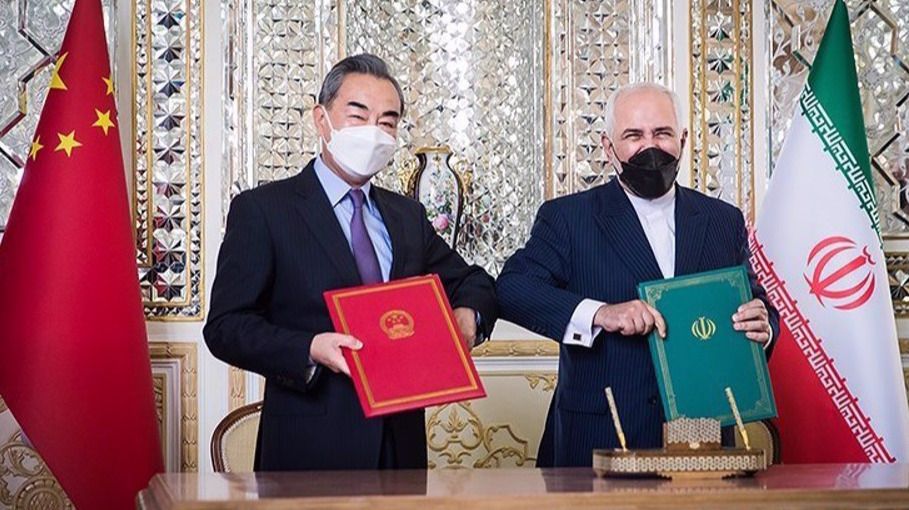
Iran’s Foreign Minister Mohammad Javad Zarif (R) and his Chinese counterpart Wang Yi are seen in Tehran during the signing ceremony
Tehran, April 5 (RHC)-- Iran’s Parliament speaker says the recent strategic cooperation agreement signed between the Islamic Republic and China is a major warning to the United States that international relations will no longer be in its favor.
“Signing of the comprehensive Iran-China cooperation agreement is an important warning to the United States to know that international relations are moving fast to the detriment of America and this country is no more in a position to unilaterally impose a model, plan or agreement on independent countries,” Mohammad Baqer Qalibaf told an open session of Parliament on Sunday.
The agreement is a “strategic step,” he said, since it tells the world that global matters are not restricted to the West, and that the “next century belongs to Asia.” Qalibaf stressed the importance of seizing the existing opportunities in order to “translate this document into real economic and political projects, plans and cooperation while safeguarding national interests.”
Iranian Foreign Minister Mohammad Javad Zarif and Chinese State Councilor and Foreign Minister Wang Yi officially signed the deal for 25-year comprehensive cooperation in Tehran on March 27.
In a post on his Instgram page on Thursday, Zarif offered a summary of the goals, principles and features of the agreement, the details of which have not been released. The Iranian foreign minister said the agreement seeks a “practical promotion” of strategic ties and offers “a roadmap and long-term horizon.”
A spokesman for China’s Foreign Ministry said on March 29 that the strategic cooperation agreement was not against any third party and only meant to further cement bilateral collaboration.
Elsewhere in his address, Qalibaf said the Strategic Action Plan to Counter Sanctions, a law passed in December by the Iranian Parliament, has unlocked the country’s nuclear industry and made the clock tick in favor of Iran.
On December 1, Iranian lawmakers overwhelmingly voted in favor of the action plan, which tasked the administration with suspending more commitments under the 2015 nuclear deal, officially known as the Joint Comprehensive Plan of Action (JCPOA). Washington had already withdrew from the deal under the administration of former President Donald Trump on May 8, 2018.
The Iranian Parliament speaker said, “The Americans should know that Iran's main strategy for getting rid of sanctions is based on defusing them, and now that the country's nuclear industry has been reactivated, it is up to them to decide and lift the Iran sanctions in toto and in a practical way.”
"Promises on paper or an incomplete lifting of the sanctions, Qalibaf said, do not meet the demands of the Iranian nation." “We have repeatedly announced that Iran will fulfill its undertakings based on the JCPOA after verifying that the lifting of the sanctions is not merely on paper.”
The fate of the JCPOA, signed between Iran and the P5+1 group of countries – the United States, Britain, France, Russia and China plus Germany – after years of diplomacy and intensive negotiations, remains unclear mainly due to Washington’s actions, including its reimpostion of sanctions on Tehran.
U.S. President Joe Biden has repeatedly spoken of willingness to rejoin the deal, but, in practice, the White House has so far been sticking with Trump’s futile pressure campaign.
U.S. State Department deputy spokeswoman Jalina Porter on Friday said a planned meeting by representatives of Iran and other parties to the deal in Vienna on Tuesday would focus on “the nuclear steps that Iran would need to take in order to return to compliance with the terms of the JCPOA.”
In response to Porter’s claim, Iran’s Foreign Ministry spokesman Saeed Khatibzadeh in an exclusive interview with Press TV on Saturday ruled out any step-by-step lifting of sanctions imposed on the Islamic Republic.
In an interview with China Radio International published on Saturday, Hossein Dehqan, a military advisor to Leader of the Islamic Revolution Ayatollah Seyyed Ali Khamenei, criticized Biden for dragging his feet over rejoining the deal, saying a return by the United States would mean the lifting of all the sanctions in no time.

